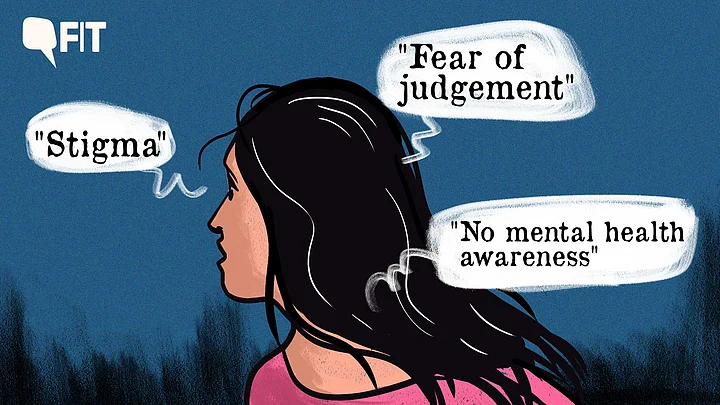Earlier this year, Prerna Kedia, a 25-year-old corporate employee based in Bengaluru, made a resolve that she won’t ever bring up or talk about any mental health-related topics at her workplace.
What made her take this decision was how her manager responded to another colleague of hers. This colleague, Kedia tells FIT, confided in their manager about how she was having trouble adjusting to the office’s work culture and was having a tough time.
While Kedia had assumed that the manager would be supportive, the latter allegedly told her:
“You should go see a psychiatrist if you are mentally unstable.”
While Kedia has struggled with her workplace and wanted to take mental health leaves on several occasions, she could never trust her manager to approve them.
But Kedia is not alone in this. Many young adults hesitate to ask their workplaces for mental health leaves.
What is holding them back? FIT asked some of them.
‘Fear of Judgement & No Mental Health Leave Provision’
Vishakha Dharmamer, a 30-year-old PR executive based in Mumbai, took a couple of mental health days off last year.
Her office did have a provision for taking mental health leaves, but she didn’t feel comfortable telling her boss about it, so instead she lied about being sick.
“I didn’t feel as supported in the organisation. I felt if I told them it was for my mental health, they’d cancel the leave and ask me to be productive instead. And I wasn’t in the mental capacity to work at all.”Vishakha Dharmamer
What also stopped Dharmamer from taking these leaves was more of a demographic factor – she felt her managers, who were much older than her, would disregard her mental health issues.
“They are set in their ways and have very traditional mindsets,” Dharamer tells FIT.
Kedia shares the same sentiment. She feels that there might be a sense of judgement towards her if she opens up. “What if my boss thinks that I’m running away from work?”
The same fear has been stopping Madhumita Sharma, a 23-year-old Delhi-based writer and journalist, from being able to express her concerns too.
Diagnosed with Obsessive Compulsive Disorder (OCD) and depression since the last few years, Sharma has often struggled to keep up pace with others.
So now, when she feels like she doesn’t have the mental bandwidth to focus on anything, she either takes a sick leave or powers through her turmoil anyway. One reason for this has been that she didn’t want her boss to think she was lazy.
“On the other hand, I also didn’t want this to be used against me – people think privileged people use mental health as an excuse, because many people have to still earn their daily wages no matter how they’re feeling or doing – I didn’t want people to mock me or see me in this light.”Madhumita Sharma
These feelings are substantiated by a 2010 study published in the Indian Journal of Occupational and Environmental Medicine that says that work-related stress and an unsupportive culture might just accelerate one’s mental health issues.
Dr Amitabh Saha, Senior Consultant – Psychiatry, Max Super Speciality Hospital, Vaishali feels that the concerns of these young adults are not superficial or as people often like to point out, “just in their heads”. He tells FIT,
“When young people grow up with adults around them who trivialise their mental health issues, they learn to not ask for support or trust those around them for any kind of help. They also fear that they might be outcasted if they open up to people.”
But, he adds, that their fears are often justified too because of the stigma associated with mental health in society. There’s a general apprehension that youngsters might have about what other people will think if they come to know.
“Those with substance abuse issues might face even more stigma if they ask for mental health leaves,” says Dr Saha.
‘Need To Normalise Mental Health Leaves’
Sakshi* (name changed on request), a 24-year-old who works at an NGO, feels that if mental health leaves were normalised by workplaces, the hesitancy among employees to avail them would decrease too.
Citing her own example, she tells FIT that her organisation offers menstrual leaves.
When she first joined the office, she would work through severe cramps because she didn’t want to inconvenience others. But since people around her were availing these without any guilt, she too slowly started doing so.
“I work in an organisation that works for mental health and I don’t have the courage to ask for a mental health day off. I find it difficult to give myself any concessions. If my workplace normalised mental health leaves, I probably might not feel as hesitant in asking my manager.”Sakshi
Dharmamer agrees with her. Though she had lied to her office about why taking mental health days off, she happily shares how much taking those few days to give her mind a break helped her.
When she returned to work, she was more focussed, more productive, much more energetic, and feeling much better about herself too.
The importance of normalising mental health leaves grows when one realises just how many people might be in need of them.
The World Health Organization had in 2022 pointed out, “15% of working-age adults live with a mental disorder.”
But there's a lot that managers and workplaces can do to bridge this gap for their employees. A 2022 study published in the Healthcare Management Forum suggests some things for people employed in formal workplaces. It says,
“Supervisors are instrumental in supporting work-life satisfaction, psychological health and well-being at work. (They should) reflect on how their positions can uniquely mediate the psychological health and well-being of the workforce.”

